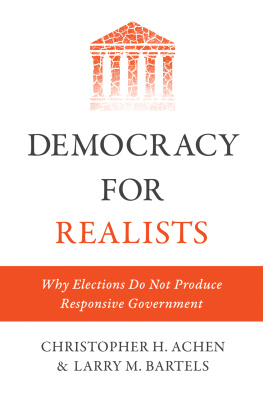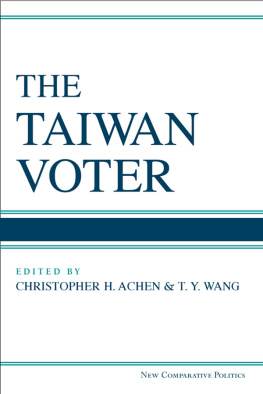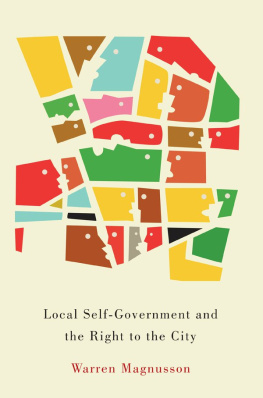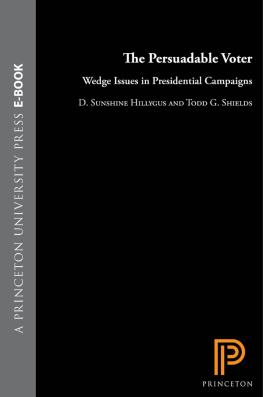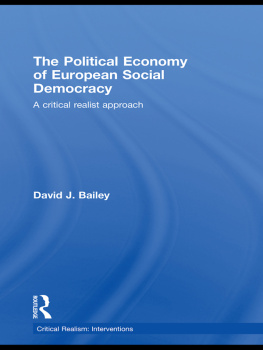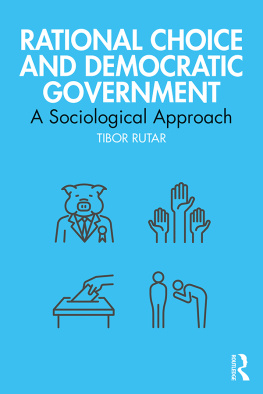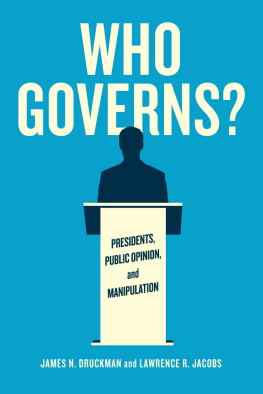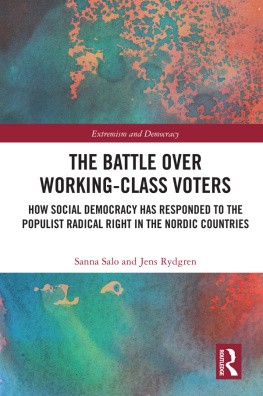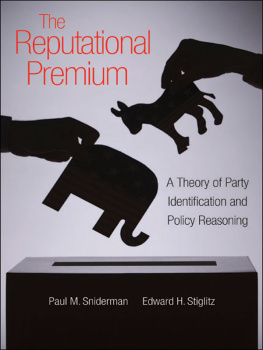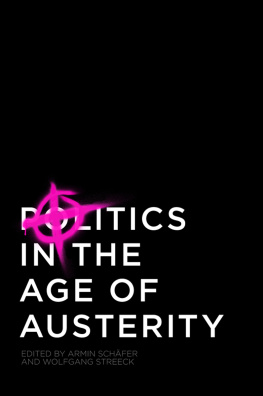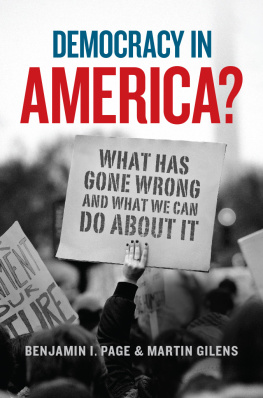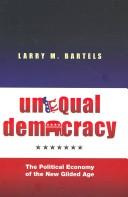
DEMOCRACY FOR REALISTS

Edited by Tali Mendelberg
DEMOCRACY FOR REALISTS
Why Elections Do Not Produce Responsive Government
CHRISTOPHER H. ACHEN LARRY M. BARTELS
PRINCETON UNIVERSITY PRESS
PRINCETON AND OXFORD
Copyright 2016 by Princeton University Press
Published by Princeton University Press,
41 William Street, Princeton, New Jersey 08540
In the United Kingdom: Princeton University Press,
6 Oxford Street, Woodstock, Oxfordshire OX20 1TW
press.princeton.edu
All Rights Reserved
ISBN 978-0-691-16944-6
Library of Congress Control Number 2016930927
British Library Cataloging-in-Publication Data is available
This book has been composed in Garamond Premier Pro
Printed on acid-free paper.
Printed in the United States of America
1 3 5 7 9 10 8 6 4 2
For Monica, who will understand.
C.A.
For Denise, the love of my life, at last.
L.B.
Contents
CHAPTER ONE
Democratic Ideals and Realities 1
CHAPTER TWO
The Elusive Mandate: Elections and the Mirage of Popular Control 21
CHAPTER THREE
Tumbling Down into a Democratical Republick: Pure Democracy and the Pitfalls of Popular Control 52
CHAPTER FOUR
A Rational God of Vengeance and of Reward? The Logic of Retrospective Accountability 90
CHAPTER FIVE
Blind Retrospection: Electoral Responses to Droughts, Floods, and Shark Attacks 116
CHAPTER SIX
Musical Chairs: Economic Voting and the Specious Present 146
CHAPTER SEVEN
A Chicken in Every Pot: Ideology and Retrospection in the Great Depression 177
CHAPTER EIGHT
The Very Basis of Reasons: Groups, Social Identities, and Political Psychology 213
CHAPTER NINE
Partisan Hearts and Spleens: Social Identities and Political Change 232
CHAPTER TEN
It Feels Like Were Th inking: The Rationalizing Voter 267
CHAPTER ELEVEN
Groups and Power: Toward a Realist Theory of Democracy 297
APPENDIX
Retrospective Voting as Selection and Sanctioning 329
Illustrations
FIGURES
TABLES
Preface
This book is the result of a long conversation. The authors first met in 1974, when Achen was a beginning assistant professor and Bartels was an even younger freshman in college. But the conversation did not begin in earnest until a quarter century later, after years of teaching and writing about public opinion, electoral politics, political representation, and public policy had left us similarly, but mostly separately, deeply uneasy about the significant tensions we saw between the findings of empirical social science and the familiar text-book portrait of democracy.
In 1998, discussion of a then-unpublished paper (Bartels 2003) and an undergraduate course Achen was teaching revealed a good deal of overlap in our evolving perspectives and concerns. We began to think and talk about potential research projects that might shed new light on the performance of democracies and on the relationship between democratic ideals and realities. By 2000 we thought of ourselves as writing a book, though its scope and thrust would obviously hinge on the results of our empirical work.
On good days, we envisioned a two-volume study of democratic politics and government. Our rate of progress to date makes it unlikely that we will complete the projected second volume focusing on democratic policy-making processes; nevertheless, we still hope to add to our existing down payment on that work (Achen 2006a, 2006b). In the meantime, even this first volume has turned out to be a much more open-ended book than we imagined, raising many crucial issues that it does little to resolve. We can only hope that colleagues and students in the years to come will find our ideas and evidence sufficiently intriguing to push further.
When we began this work, we thought about democracy in much the same way that most democratic citizens do. The gap we perceived between conventional democratic ideals and the all-too-visible realities was troubling precisely because we took the ideals seriously. Nevertheless, we believed that record the depressing failures of all those defensive positions. At that point, we knew that we had to start over from a completely different foundation, and the remainder of the book makes a start on that task.
Thus, the book resulted in a kind of intellectual conversion experience for us. Much of what we had believed and trusted turned out to be false. To be faithful to the evidence and honest with ourselves, we had to think very differently. In consequence, we have become used to listening to our colleagues and neighbors talking about this subject and feeling that their entire frame-work for thinking about democracy is really quite different from ours. In consequence, many readers may find this book irritatingor worse. We can only say that we sympathize; we would once have thought it quite irritating, too.
When we began our active collaboration, Achen taught at the University of Michigan and Bartels at Princeton University. As we finish the book, Achen is at Princeton and Bartels is at Vanderbilt University. We are grateful to special colleagues and students at all three institutions for the many stimulating discussions and debates that we have enjoyed. These three universities also provided timely leaves from teaching, generous funding for research and travel, and substantial infrastructure and administrative assistance, all of which were indispensable to the long process of discussion, research, and writing reflected in this book. Michigans Political Science Department and its Center for Political Studies, Princetons Politics Department, Woodrow Wilson School, and Center for the Study of Democratic Politics, and Vanderbilts Political Science Department and its Center for the Study of Democratic Institutions have all provided congenial settings in which to pursue our studies. Barb Opal, Diane Price, Michele Epstein, Helene Wood, Jayne Cornwell, and Shannon Meldon-Corney have been unfailing sources of both logistical assistance and moral support.
Over the past dozen years we have taught a variety of graduate and undergraduate courses drawing on the material presented heresometimes separately, sometimes jointly, and sometimes in collaboration with political theorists Arlene Saxonhouse at Michigan and Steve Macedo at Princeton. We thank Arlene and Steve most warmly for broadening our theoretical horizons and for demonstrating the great value of serious, thoughtful contact between political philosophy and empirical evidence. We also thank our students for providing a great deal of helpful feedback on our arguments and exposition, and Jim Kuklinski for sharing equally helpful comments and advice on a draft of the manuscript from his graduate students at the University of Illinois. We are indebted, too, to Dorothy McMurtery, who talked with us about her life and helped us understand how identities evolve.
Most of are based on unpublished papers originally presented at annual meetings of the American Political Science Association and the Midwest Political Science Association. These and other chapters have also been presented by one or both of us in numerous seminars from Madrid to Taipei. Although we cannot acknowledge individually the many hosts, discussants, and audience members who made these events so stimulating and instructive, their contributions are very much woven into the fabric of the book. We are especially grateful to friends at Yale, Stanford, and UCLA for providing helpful reactions to over-views of the entire project, and to Jon Bendor, Walter Dean Burnham, Emilee Chapman, Josh Clinton, Barbara Geddes, John Geer, Marc Hetherington, John E. Jackson, Karen Long Jusko, Orit Kedar, Melissa Lane, Skip Lupia, David Mayhew, Emily Nacol, Bing Powell, Bob Putnam, Andrew Sabl, Phil Shively, Richard Sinnott, Paul Sniderman, Jim Snyder, Jim Stimson, Sue Stokes, Lynn Vavreck, Stephen Walker, and Alan Wiseman for advice and encouragement along the way. We also thank our editor at Princeton University Press, Eric Crahan, and our colleague and series editor, Tali Mendelberg, for their assistance and their generous encouragement.
Next page
